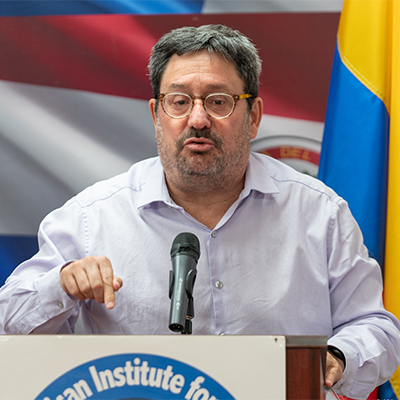Beware Latin America, merciless misinformation

By: Francisco Santos - 20/06/2025
Share:
Colombia is experiencing a critical moment in the survival of its democracy. Its so-called president (who, little by little, became a dictator) accuses anyone who opposes him, even if they obey the law, of sedition. So, the three clear cases of disinformation that have occurred in the country in the last 10 days are no coincidence. Dictators and dictatorships, with the support of foreign powers, especially Russia, a country expert in disinformation, use social media, cybercache, and artificial intelligence to create narratives, destroy opponents, and achieve their political objectives.
Many cases. For example, the elections in Slovakia in October 2023 pitted two candidates against each other: one, Robert Figo, was a nationalist, openly pro-Russian, and opposed to sanctioning that country; the other, Michal Simecka, was a pro-European candidate who was leading and appeared to be the winner, albeit by a narrow margin. Two days before the elections, during the electoral blackout period, when traditional media outlets cannot discuss politics or candidates, an audio recording manipulated by artificial intelligence surfaced. The fake conversation was between Simecka and a journalist, in which they discussed how to rig elections and buy votes. The audio recording spread virally across social media, and Simecka's campaign failed to distort it. The result: Simecka lost his lead, and Figo won the elections. The big winner, without a doubt, was Russia.
Two more examples. In Romania, the Constitutional Court annulled the results of the first round of the presidential elections two days before the second round, on December 6, 2024. The reason? A far-right, pro-Russian candidate, Calin Georgescu, unexpectedly won, with the help of massive hacking and disinformation campaigns originating from Russia. Romanian intelligence managed to decipher this operation, handed it over to the President—yes, that one with a capital P—who made it public, and the Court acted.
In the last Colombian elections, tens of billions of pesos were used in the first round to damage a candidate, Fico Gutiérrez, so he wouldn't make it to the second round. Then, in the second round, another similar amount was used to discredit Gustavo Petro's rival. These funds, as an expert on the subject who followed the proceedings but asked me not to comment, came from abroad, especially from Russia, told me.
Three cases of disinformation in Colombia, which are linked because they all point in the same direction. First, the wineries, financed by Venezuela—or other countries, we don't know—and which support Maduro and Petro, began to massively create the narrative of an attack orchestrated from Miami by a Venezuelan political advisor to harm the Colombian dictator. Is this surprising? No. In fact, the only one who has responded vigorously to the allegations of possible Venezuelan support for this attack is Diosdado Cabello, currently accused of the murder of a Venezuelan lieutenant seeking asylum in Chile.
The second case concerns alleged audio recordings, very similar to those from Slovakia, where General Óscar Naranjo, former police chief and former vice president of Santos, made alleged revelations with a beneficiary, Petro, and his henchmen. These "revelations," which are a deepfake created using artificial intelligence, reinforced the narrative of the radical left. There were some 29 audio recordings uploaded to YouTube, which sparked a significant backlash in certain political sectors in Colombia. The truth is, the only thing missing, as the retired general himself told me last Sunday, was for the audio recordings to accuse him of shooting Miguel Uribe.
They were testing the waters for what's coming. The left's agenda is chaos, and what they're going to do this year to defend the dictator will know no bounds. Naranjo's fake audio recordings are the beginning, which already had an even more perverse development with the fake statement, supposedly from the Santa Fe Foundation, announcing the death of Miguel Uribe. What did they want to achieve with this disinformation? I have no doubt it was to test the reaction of Petro's opponents in the event of a death, in this case, that of the senator. This shows that other murders are coming and that they are testing the waters with public opinion. They want to test how far democratic society will respond to the violence they are going to wield.
The idea is for Petro to stay in power, and with the chaos of the reactions to their violence, he can suspend the elections. Last Sunday's massive "March of Silence" showed what we can do and how to do it: without buses, without lunches, without payments, and without violence. Certainly, the civil and democratic resistance that must begin to be exercised against the dictator cannot fall prey to the provocations that the violent ones want to be used to benefit Petro's authoritarian agenda.
Yes, not paying taxes or a national strike are two actions that must be ready for the moment the Colombian dictator shows his final card, which is to suspend the elections. Furthermore, the non-payment of taxes can be implemented gradually, in response to the dictator's actions.
Let's not be naive. This is orchestrated, and they want to create chaos that will facilitate the suspension of the elections. However, the final, great measure of civil resistance must come when he makes public the decision, which he has already made in his crazy head, to stay. Then, we will call on those hundreds of thousands of Colombians to peacefully take over the Nariño Palace to remove him from power. The vice president must finish her presidential term.
The violent and dictatorial leaders of the continent and abroad have an agenda that—surprise!—has a beneficiary: the dictator of Colombia. Let's not be provoked. They're testing us. Democratic and peaceful civil resistance that shows what we are, so that when it's our turn to remove the dictator from power, the world will know the reason: defend the freedom and democracy of Colombia.
«The opinions published herein are the sole responsibility of its author».